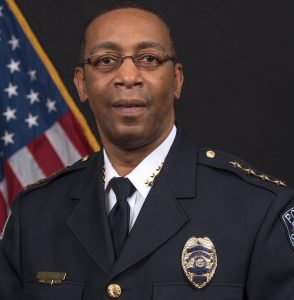Clark resigns as Fort Smith police chief (Updated)
by March 27, 2019 1:35 pm 3,167 views

Editor’s note: Updated with additions and changes throughout.
Fort Smith Police Chief Nathaniel Clark, the city’s first African American chief, resigned Wednesday (March 27) after just a little more than two years in the role. The last day on the job for Clark, who is taking a job in the metro Atlanta area, is April 8.
He succeeded Chief Kevin Lindsey, who was pressured out after making racial comments about the lack of minority police officers. In his resignation letter, Clark thanked the city for the opportunity to serve and make “positive changes.”
“The landscape has changed over the past two years with new and different challenges and I am pleased with the fact that we have implemented positive changes, endeavoring to make the City of Fort Smith a safer place … ,” Clark wrote. (Link here for a PDF copy of his resignation letter.)
Clark took over the department on Jan. 9, 2017 with a charge to address hiring disparities in a way that better reflects the city’s demographics. While the department worked toward its inclusivity goal in his first year, it also witnessed a 10.6% drop in reported crimes, with 6,212 in 2017 against 6,944 the previous year. Clark credited community support and “community-first policing” to the changes, and was one of eight finalists for the 2018 “Chief of the Year” award that is part of the 51st Annual Convention of the Arkansas Association of Chiefs of Police (AACP).
“Chief Clark has accomplished a lot here in Fort Smith in less than two years,” Geffken noted in a statement with Clark’s nomination for chief of the year. “He’s risen to become one of Arkansas law enforcement’s brightest stars — a shining example of what a municipal police chief should be. We are very proud of him, his hard work, and we have complete faith in his ability to continue lead his force on the path of progress for the City of Fort Smith.”

On the diversity issue, the department increased its number of black, hispanic, and female officers. Since 2016, it has improved the number of black officers to 4% of staff against 1%. The Hispanic demo is now at 7% from 5% previously, and female officers are at 8%, up from 5% in 2016.
Department improvements made by Clark include:
• 3% Staff Pay Increases for sworn and civilian staff;
• Enhanced equipment, including tasers, combat gear, and motorcycles; and
• Additional staffing, with Clark able to convince the Fort Smith Board to lift a hiring freeze.
Clark told Talk Business & Politics the two priority items on his to-do list if staying in Fort Smith were creating a second precinct on the east or south side of the city, and providing body cameras to every officer.
“I wanted to make sure every officer has a body camera. We owe it to not only the officers, but the community, to have all those body cameras,” he said.
Clark also said he believes the next hiring class “will be the most diverse” in the department’s history.
The chief admitted to challenges and encountering elements of racism in his job, but said he and his wife were “overwhelmingly” welcomed by the community.
“Have we had challenges? Yes. But challenges provide the opportunity for growth,” Clark said, adding later that reducing crime and increasing the budget for technology and equipment would not have happened without community support.
